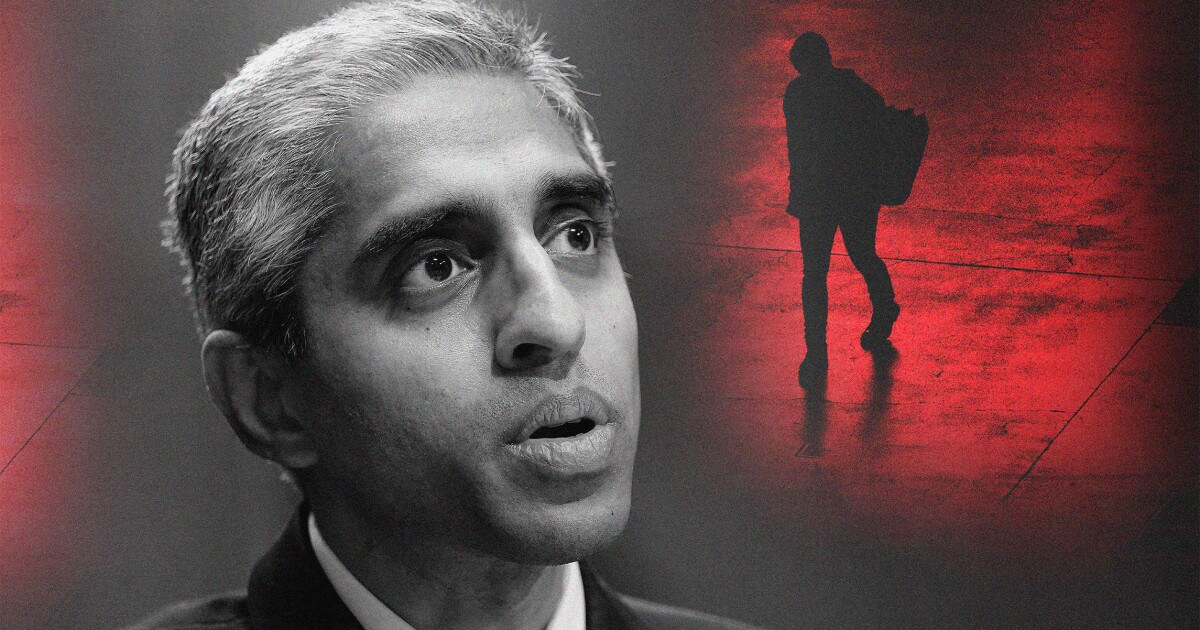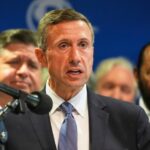

For decades, black-and-white surgeon generals’ warnings have appeared on cigarette packs and bottles of beer advising adverse health effects. Now, the office is taking on a new, more nebulous challenge — America’s loneliness epidemic.
Surgeon General Vivek Murthy warns that the United States is lonelier than ever and that such isolation is just as dangerous as smoking or drinking to excess.
KAMALA HARRIS TAKES HER PLACE AT THE DEBT LIMIT NEGOTIATING TABLE
“Loneliness is far more than just a bad feeling — it harms both individual and societal health,” Murthy writes in a letter opening his 82-page report. “It is associated with a greater risk of cardiovascular disease, dementia, stroke, depression, anxiety, and premature death.”
In an allusion to surgeon general crusades of the past, Murthy then says being socially disconnected has a similar mortality impact to smoking up to 15 cigarettes a day.
Murthy has turned his attention to loneliness now that COVID-19 is fully in the rearview mirror, and the report makes several alarming claims that social isolation is and should be treated as a health problem in the same way as obesity, idleness, smoking, or alcoholism.
Social isolation poses a greater risk than obesity and physical inactivity, per the report, and permeates all aspects of society, from schools and workplaces to the economy and civil society.
Murthy aims first to destigmatize loneliness and have it recognized as a major health issue, calling for vastly increased research on the topic and for individual actions that range from turning your phone off to spending more time in church. Belonging, he says, is a fundamental human need.
In doing so, Murthy may raise the surgeon general’s profile, and his own, in a way not seen in decades.
At 45, Murthy is already in his second stint as the nation’s top public health spokesman. He first got the gig at age 37 in 2015, becoming the youngest surgeon general in history, over Republican objections to his love of Obamacare and gun control.
He left office shortly after Donald Trump became president, then got it back for a second time under President Joe Biden. His loneliness report was created alongside a host of medical leaders and issued following a cross-country listening tour.
Murthy is now working hard to promote the report. Though he declined an interview request for this story, he has spoken with the likes of Oprah Winfrey and ESPN personality Stephen A. Smith to get the word out.
Tackling mental health is a bold new direction for the office and not one without its share of detractors. Cato Institute health policy scholar Jeffrey Singer agrees loneliness is a problem but questions whether it’s one for the federal bureaucracy to solve.
“The knowledge base for this is in its infancy, and there are many different opinions on how to interpret the data that we have,” Singer, who is a general surgeon himself, said. “We’ll look back 10 years from now and say, ‘How did we think that back then?’ It’s a relatively new, amorphous area of important study. To me, this is not what public health should be involved in; it’s an area for private health.”
A recent example of centralized public health gone wrong, Singer argues, is the pandemic, in which public figures, including Murthy, endorsed stringent policies that later proved suspect. The fear is that anything the surgeon general puts out, even if billed as only a suggestion, will be taken as an ironclad truth with vast policy consequences.
But Singer also questions some of the attention-grabbing claims in the report, such as the one about chronic loneliness equating to 15 cigarettes a day.
“There are so many different variables and gradations of loneliness,” he said. “If I’m only lonely until my wife gets home, what is that, like four cigarettes?”
Then again, the office has evolved significantly throughout its history.
The first surgeon general was appointed in 1870, originally focused on disabled seamen and then gradually on general public health. The office is probably most famous for its anti-tobacco efforts, first under Kennedy appointee Luther Terry and then in the 1980s under C. Everett Koop, the first surgeon general to become a household name.
The bearded and bespectacled Koop turned up the pressure on tobacco companies with a 1988 report linking the addictiveness of nicotine to that of heroin or cocaine and, the same year, mailed AIDS information to every U.S. household.
Subsequent surgeons general have not been so famous, and the most recent, Trump appointee Jerome Adams, complained he couldn’t get a job afterward due to his association with The Donald.
Murthy became not only the youngest but also the first Hindu to take the office, and an interesting wrinkle in the loneliness report is its emphasis on faith as an antidote. The terms “religion” or “religious” appear 14 times in the document, and “faith” is mentioned five times.
It laments that just 47% of the country now reports belonging to a church, synagogue, or mosque, down from 70% as recently as 1999. In fact, more people now report feeling lonely than going to church.
“Religious or faith-based groups can be a source for regular social contact, serve as a community of support, provide meaning and purpose, create a sense of belonging around shared values and beliefs, and are associated with reduced risk-taking behaviors,” it reads.
John Haught, a theology professor emeritus at Georgetown University, says it’s refreshing to see a scientific figure like Murthy embrace the benefits of faith.
“What we really need for real, tight connectedness is a great hope held in common,” he said. “When Jesus came into his public ministry, he didn’t have a list of do’s or don’ts. The first thing he said was, in effect, that something big is coming. The sense that something is coming was his most important message. People tend to gravitate together when they can share a great hope.”
The decline of religion in the United States has correlated with the rise of the internet and screens, which is borne out in the report’s statistics. In-person time spent with friends has fallen by two-thirds since 2003 and by 70% for those aged 15 to 24. Meanwhile, the number of single-person households more than doubled between 1960 and 2022.
Murthy’s report seeks to raise awareness and research dollars about the health impacts of social isolation, which it says costs Medicare $6.7 billion a year and raises the risk of premature death by 29%. It even calls for movies and TV shows to explore the topic.
Reversing the trend may prove more difficult. The report ends with a list of recommendations, which are somewhat vague concerning politically sensitive topics like the effect of remote work and the role of Big Tech.
CLICK HERE TO READ MORE FROM THE WASHINGTON EXAMINER
But when it comes to parents and individuals, things are more direct.
“Reduce practices that lead to feelings of disconnection from others,” it reads. “These include harmful and excessive social media use, time spent in unhealthy relationships, and disproportionate time in front of screens instead of people.”





